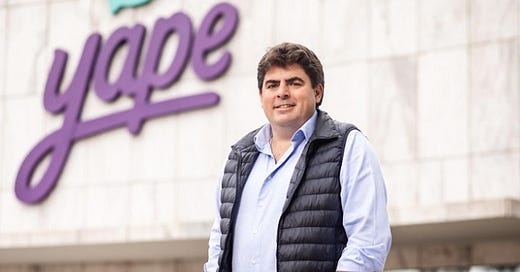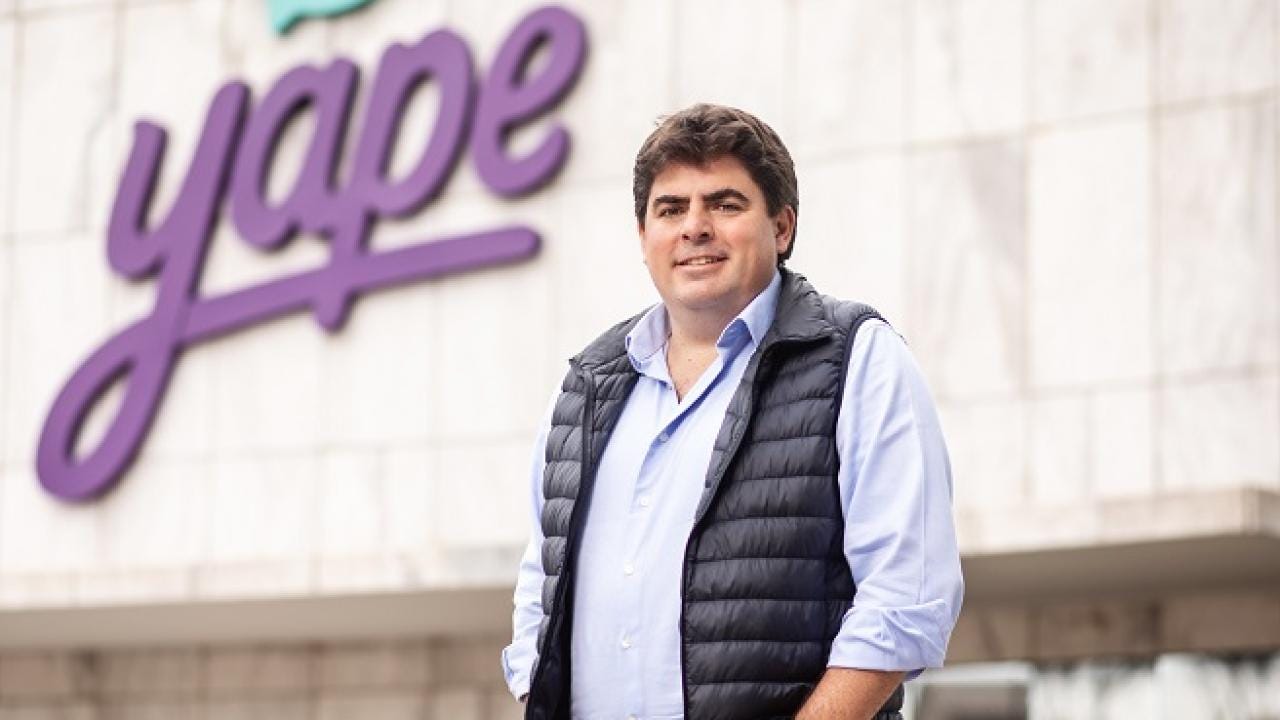This article is part of Fintech Leaders, a newsletter with almost 70,000 builders, entrepreneurs, investors, regulators, and students of financial services. I invite you to share and sign up! Also, if you enjoy this conversation, please consider leaving a review on Apple Podcasts or Spotify so more people can learn about us.
Raimundo Morales is the CEO of Yape, the dominant fintech app in Peru and certainly one of the biggest consumer fintechs in the world. Yape has 16 million users in Peru, which represents 80% of the country’s total population. On average, they process 550+ million payments a month and are doubling in volume on a yearly basis. They are big and extremely important for the country. If Latin America runs on WhatsApp, it’s fair to say Peru runs on Yape.
In this episode, we discuss:
The strategy that led them to onboard 65% of Peru’s adult population as daily active users in just eight years
“After getting to million users, then it was okay, let's get to 10 million Peruvians. People thought we were completely crazy, right? The whole banking system didn't have 10 million clients when we defined that target. And we got there, and now we're at 16 million clients.”
Yape's initial success was built on simplicity as a core principle—enabling quick and easy peer-to-peer (P2P) payments. By reducing the complexity of mobile payments to just a few clicks, Yape became accessible to less digitally savvy users, establishing itself as a trusted app for everyday transactions across the country. This approach set the bar for user experience, ensuring that any new feature was just as simple and seamless, reinforcing user engagement and driving adoption.
After establishing itself with basic P2P payments, Yape strategically expanded into other high-frequency payment types, such as mobile top-ups, bill payments, and eventually, a broader marketplace. By addressing daily needs—like mobile top-ups, which were traditionally cumbersome and cash-dependent—Yape embedded itself deeper into the daily lives of Peruvians. Recognizing that a significant portion of the Peruvian population remains underserved by traditional financial institutions, Yape recently introduced microloans tailored to the informal economy. These small, short-term loans are designed with the specific needs of the unbanked in mind, offering a low barrier to entry and automatic repayment.
Yape was built within Credicorp (NYSE: BAP), a $14Bn company traded on the NYSE. How were they able to build a fintech disruptor within a large corporation?
Yape was built with a distinct and independent strategy within Credicorp's large structure. By setting up a dedicated innovation team and keeping it TRULY INDEPENDENT, Yape has been able to operate like a startup within the corporation, free from the constraints typically associated with large enterprises. This autonomy has allowed Yape to move quickly, experiment, and iterate without the immediate pressure of delivering short-term financial returns, which has been key to its success.
Credicorp's leadership, led by Gianfranco Ferrari and Francesca Raffo, embraced a long-term perspective, focusing on the broader goal of winning "the war on cash" rather than immediate profits. This approach allowed Yape to develop and scale without a clear initial business case, ultimately enabling it to serve millions of unbanked and underbanked Peruvians. Thinking in decades rather than quarters has been instrumental for the organization’s ability to grow from a small app to a national powerhouse.
Despite staying independent from the mothership, Yape has cleverly and effectively utilized the advantages that come from a large corporation. For example, Yape utilized Credicorp’s extensive branch network to accelerate its growth, integrating this traditional infrastructure to onboard and educate users for the first time. This hybrid approach is probably the winning formula in economies that are still highly reliant on cash and analog banking systems, much like Peru.
The road to building a super-app
“The most important principle is that we make irrational goals a reality.”
Yape’s transformation from a payments app into a super-app has been driven by its ability to anticipate and address both expressed and unexpressed needs of its users. By analyzing user behavior and identifying pain points in daily activities, Yape has continuously introduced new functionalities like a marketplace, gaming credits, and ticketing services. This approach has diversified Yape’s offerings and also helped the firm solidify its position as a platform that simplifies various aspects of its users’ lives through digital solutions.
Why you should always set irrational goals, winning the war on cash… and a lot more!
“The Peruvian economy depends on us. If Yape is out for an operation stability issue for one hour, that means that 100,000 people got into a taxi and couldn't pay when they got out [of the taxi].”
Raimundo Morales is a firm believer that to disrupt and lead, setting ambitious, seemingly irrational goals is essential. This philosophy has been a cornerstone of Yape's strategy, where the team is always targeting exponential growth and very ambitious outcomes. But while setting irrational goals is key, any startup builder will know that in the end it all comes down to relentless execution to turn these goals into reality. Raimundo describes his role as CEO to continuously push the team to execute at the highest level, helping them overcome obstacles and finding innovative solutions to challenges.
The craziest part to me is that today, Yape is much more than a financial super-app; it has become a crucial part of Peru’s economic infrastructure. The company now holds immense responsibility—if the app is down even for an hour, it disrupts the lives of hundreds of thousands of Peruvians who rely on it for daily transactions. Incredible for a brand that didn’t exist just eight years ago.
Want more podcast episodes? Join me and follow Fintech Leaders today on Apple, Spotify, or your favorite podcast app for weekly conversations with today’s global leaders that will dominate the 21st century in fintech, business, and beyond.


























Share this post